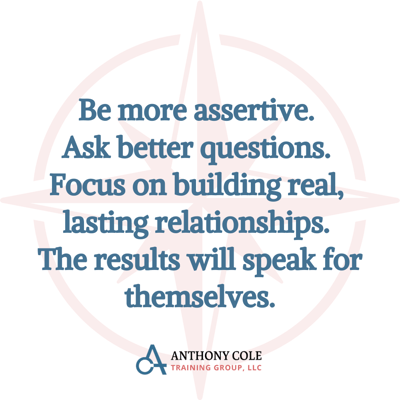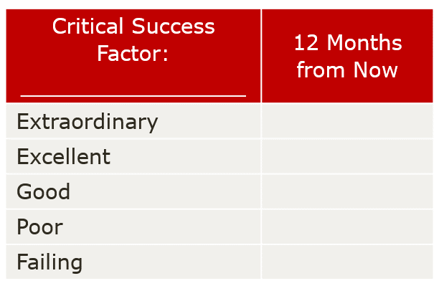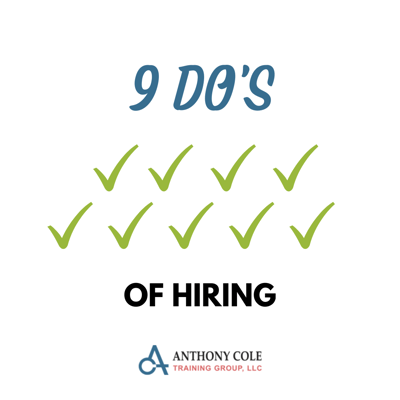Chapter 1: Relationship Selling - The Key to Your Sales Challenges
In today’s unpredictable and rapidly shifting markets, one of the most persistent challenges in sales is staying focused on adding value, not just making the sale. That’s where relationship selling comes in. While this concept isn’t new to most of us in sales, applying it effectively and consistently is where the real challenge lies.
Many organizations are striving to become more customer-focused. But how can advisors and sales professionals remain productive and assertive without sounding overly sales-driven?
The Power of Assertive Relationship Selling
Here’s the truth: Assertive salespeople, those who lead with confidence and care, win more business. These professionals are so committed to doing what’s right for their clients that they’re willing to risk the sale to help the customer make the best possible decision.
This is the essence of relationship selling: prioritizing the long-term relationship over the short-term win.
Assertiveness in sales isn’t about pressure, it’s about clarity, curiosity, and courage. When done well, your early conversations help qualify (or disqualify) prospects quickly and respectfully. That means less wasted time chasing people who will never buy, and more energy directed toward solving real problems for real buyers.
The Discovery Process: Ask Better, Sell Smarter
In those initial, assertive conversations, your goal is to uncover the prospect’s real pain:
- What problems are they facing?
- What have they done to try and solve them?
- How is their current provider performing?
These conversations aren’t just about gathering surface-level information. They’re about building insight, so you can determine whether a true, mutually beneficial relationship can form.
In our sales methodology, a qualified prospect must meet three key criteria:
- They have a compelling reason to buy or make a change.
- They have the resources and willingness to invest (time, money, effort).
- They have the authority and readiness to make a decision, including financial decisions.
Bold Questions That Build Relationships
To discover whether a prospect qualifies, you need to ask bold, sometimes uncomfortable questions, questions that require assertiveness and emotional intelligence.
Here are a few examples:
- “How will you go about telling your current provider that you’re moving in a different direction?”
- “If funding is limited, how do you plan to address the problem?”
- “The budget you mentioned won’t achieve your goals. What would you be willing to compromise?”
- “What will you do if your partner isn’t on board with making this change?”
Imagine having the confidence to ask these questions regularly. What would happen?
You might fear losing opportunities, but in reality, you’d likely gain more meaningful ones. You’d eliminate indecision, shorten your sales cycle, and build trust by helping your prospects face their own obstacles head-on.
Final Thought
Relationship selling, when done with assertiveness and empathy, doesn’t just help you close more deals, it helps you close the right ones.
When you stop making presentations to people who can’t say “yes” and start focusing on those who are ready to move forward, your entire sales process becomes more efficient, more effective, and more rewarding.
So, if you’re facing challenges in your sales process, try this:
Be more assertive. Ask better questions. Focus on building real, lasting relationships. The results will speak for themselves.

Chapter 2: Build Lasting Relationships in Sales
If your goal is to retain and grow client relationships, you must consistently create a remarkable experience for your customers and prospects. Because if you’re not providing that superior experience, rest assured, your clients may start wondering, “Who else will?”
Ask Yourself These Key Questions:
To evaluate your customer relationship strategy, reflect on the following:
- What are you doing to keep your clients happy and satisfied?
- Are your clients referring others to your business?
- Is your organization delivering an exceptional experience at every touchpoint?
- Are you learning your clients’ wants, needs, and pain points, every single day?
- Are you under-promising and over-delivering?
What Can We Learn from Disney?
Think about a place where you wait in long lines, spend a lot of money, and still leave excited to tell others how great your experience was. For many, that’s Disney.
Disney has built decades of success by exceeding expectations and creating passionate brand advocates. In Inside the Magic Kingdom, author Tom Connellan outlines seven keys to Disney’s customer experience strategy. The biggest takeaway? Their “magic” isn’t random, it’s the result of a consistent, intentional process that dazzles.
Dazzling Experiences Aren’t Optional
To truly impress your clients:
- Your service must be predictable and consistent.
- Your clients must know what to expect and trust you to deliver.
- It can’t be a once-in-a-while thing, it must be how you do business, every day.
This doesn’t mean treating everyone the same. Your top 20% of clients should get a different level of attention than your bottom 20%, but everyone should get the basics done right, every time.
If you want to stand out from competitors and earn long-term loyalty, you need to go beyond service, you need to dazzle. Treat your advocates like family. It’s not extreme, it’s what separates memorable companies from forgettable ones.
Because in business, it’s always the little things that matter.
4 Strategies to Retain and Create Loyal Advocates:
- Find out what they want
Don’t guess, ask. Give clients a list of preferences and allow space for them to tell you what really matters.
- Prioritize critical areas
Clients won’t always tell you what’s wrong. Just like saying “It was fine” at a restaurant, they may avoid conflict. Dig deeper to find the real issues.
- Identify their performance bar
Where are they setting expectations? Don’t assume. Find out and then evaluate if you’re meeting or exceeding them.
- Negotiate expectations
If something doesn’t align with your process, say so. Don’t agree out of fear of losing a deal, because if expectations don’t align now, they won’t later either. That client is unlikely to become an advocate anyway.
Final Thought
This all assumes that you already have the business acumen to understand your clients’ industry, goals, and challenges. But even then, never assume you know what they expect, ask them.
That simple conversation can lead to extraordinary results: repeat business, strong referrals, and loyal client relationships that last.
Because when you understand expectations, exceed them, and stay consistent, your clients will not only stay, but they’ll also bring others with them.
Want to keep reading?
Download the entire book for free here!
-2.png?width=400&height=400&name=free%20download%20(1000%20x%201000%20px)-2.png)

-2.png?width=400&height=400&name=free%20download%20(1000%20x%201000%20px)-2.png)







